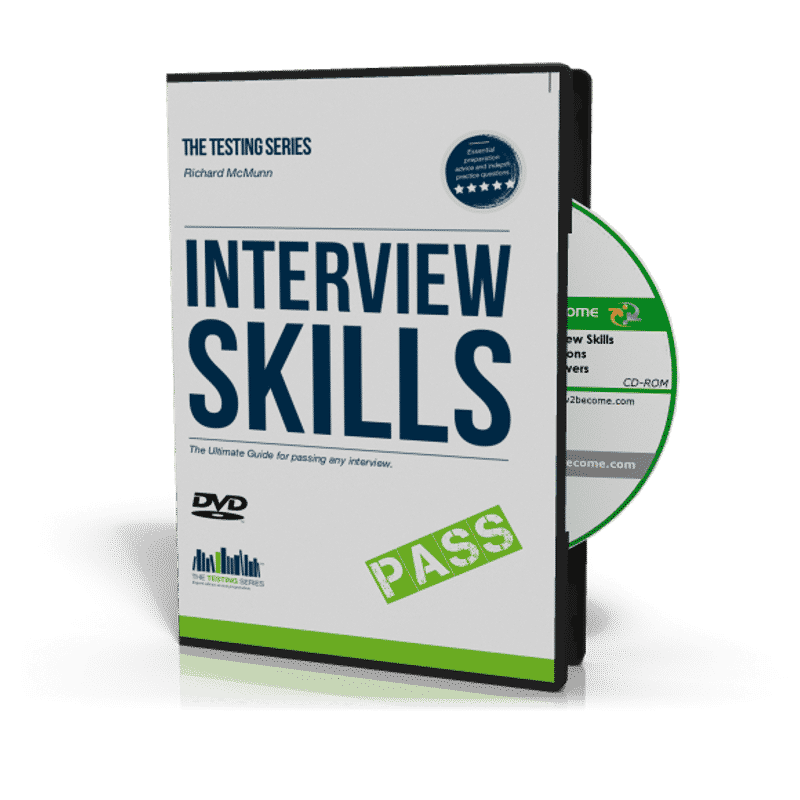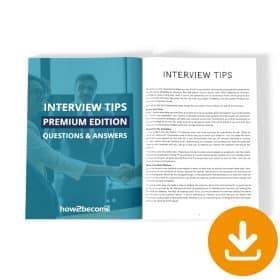How to pass an Interview
Learn how to pass an interview with our Interview Skills guide that contains invaluable advice and tips on how to pass any job interview.
ORDER NOW

It is standard practice to ask certain questions at an interview and therefore well worth preparing answers to these in advance. You should also try to think about other questions the interviewer might ask you based on the position itself and your application. In this article we will provide you with some useful tips on how to pass interviews.
The questions asked at the interview will cover areas such as yourself, the job you have applied for and, possibly, specific technical questions about your chosen subject. Some of the following questions may not be relevant if you are applying for your first job after qualifying from university or leaving school.
You may be asked a question at interview that completely throws you.
If water has been provided, take a sip to give you some thinking time. Stay calm and try to think about why the interviewer has asked the question and what are they looking for in you.
Never underestimate the power of a sense of humour but be careful – not everyone finds the same things funny. If you make the interviewer or interviewers laugh they are likely to remember you. It is possible that your interviewer will become your colleague if you are appointed and this is something they are unlikely to forget!
As a sales manager with our company you’ll be organising and leading a team of sales representatives. You will also be responsible for a particular type of product or customer and be in charge of a particular geographical area.
YOUR RESPONSIBILITIES WILL INCLUDE:
• Setting sales targets for individual reps and your team as a whole, according to company guidelines.
• Recruiting and training sales staff.
• Allocating areas to sales representatives.
• Developing sales strategies and setting targets.
• Monitoring your team’s performance and motivating them to reach targets.
• Compiling and analysing sales figures.
• Dealing with some major customer accounts yourself.
• Collecting customer feedback and market research.
• Reporting back to senior managers.
• Keeping up to date with products and competitors.
HOURS AND ENVIRONMENT
Normally, you’ll work 9am to 5pm, Monday to Friday. However, you may have to work longer when necessary and there will be some weekend work as and when required. You’ll be office-based, but also spending some of your time visiting customers, head office, and your sales team in the field. You may also need to attend conferences, trade fairs and exhibitions.
SKILLS AND INTERESTS REQUIRED FOR THE ROLE
• Excellent sales and negotiation skills
• The ability to motivate and lead a team
• Initiative and enthusiasm
• Excellent communication and ‘people skills’
• Good planning and organisational skills
• The ability to work calmly under pressure
• Good IT, budget and report writing skills
• A full driving licence
• Foreign language skills are increasingly useful.
Q. Give an example of where you have successful led a team through a project or brief.
Q. Provide details of any managerial experience you have to date.
Q. Have you ever been responsible for a large team or geographical area? If so, what challenges did you face and how did you overcome them?
Q. Give examples of when you have set targets for members of a team and how you went about monitoring their progress.
Q. How would you carry out target setting for a member of your team?
Q. Describe a time when you had to carry out a performance appraisal for a member of your team?
Q. What qualities does an effective team leader require?
Our comprehensive interview workbook will teach you how to pass an interview and will also supply you with 50 sample interview questions and answers.
Q. Can you tell me a little bit about yourself and why you are interested in this particular area of science?
Q. What made you apply for this post / job?
Q. What things did you enjoy most about university / school?
Q. Why are you leaving your current job?
Q. What particular qualities do you possess that would help in this job?
INSIDER TIP: Try to avoid vague answers to these questions, for example when asked about why you became interested in the particular branch of science give examples of something specific that sparked your interest, talk about someone who inspired you etc.
You may also decide to visit the UK Governments website on how to prepare for interviews at www.direct.gov.uk.
Q. Tell us about your previous experience and how it is relevant to this role.
Q. Please describe any major achievements over the past 2 years, either in your academic career or outside university / school.
Q. You may be asked to describe a particular laboratory technique relevant to the job, e.g. describe the principles behind gas chromatography.
INSIDER TIP: Be prepared for questions on any major scientific issues e.g. stem cell research which may have been in the news recently. If possible, relate it to a recent article you have read in a professional journal. When interviewers ask this type of question they are looking at your knowledge of topical scientific issues and events.
Our comprehensive interview guide will show you how to use your time effectively, dramatically increasing your chances of success.
Remember that in the majority of cases you will be asked interview questions that are directly related to the role that you are applying for so make sure you prepare fully.
TOPICS AND INFORMATION INCLUDED WITHIN THIS GUIDE INCLUDE:
HOW TO PASS THE INTERVIEW AND INTERVIEW QUESTIONS
Contains sample answers to 50 of the toughest interview questions!

ORDER NOW
[col span="3"][/col][col span="6" span__md="12"] [ux_price_table title="" price="$9.56" featured="true" color="light" depth="2" depth_hover="4"]
